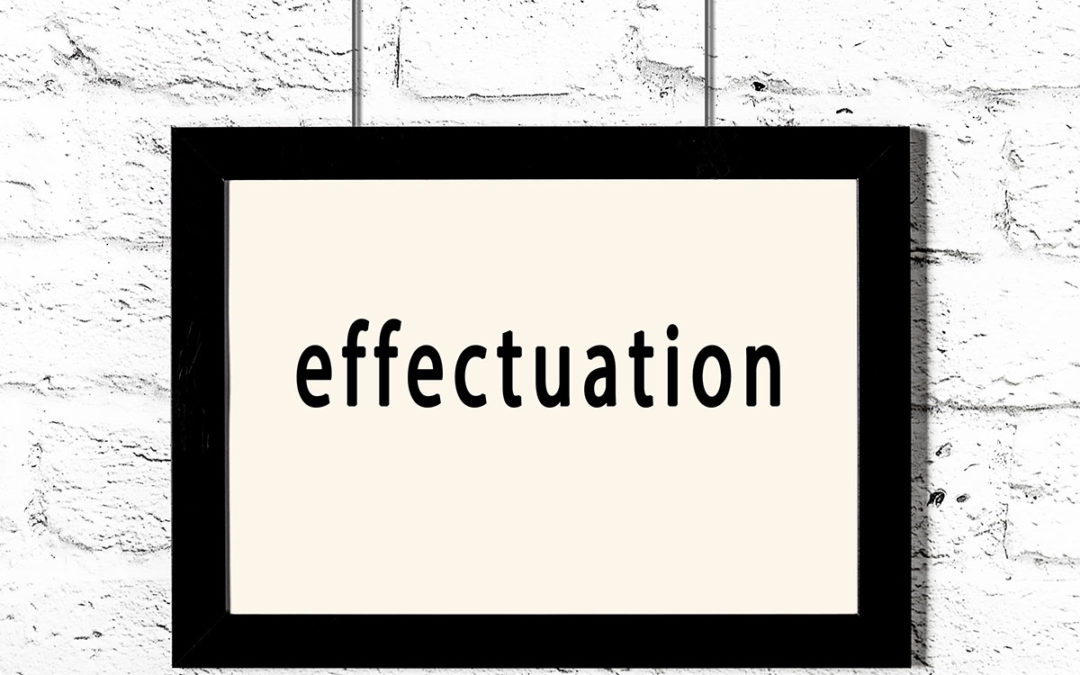or “When life offers you lemons, make lemonade.”
Effectuation
In an increasingly less “predictable” and “foreseeable” environment, causal logic is no longer always helpful in achieving predetermined/agreed goals.
The effectuation approach gives us a more flexible approach to achieving goals and turns causal logic on its head, so to speak.
The Effectuation Principles:
- 1. Centre orientation – the “bird in the hand” principle
While causal logic focuses on selecting means to achieve goals, we concentrate on finding goals that can be achieved with the available means.
- 2. Affordable loss
In causal logic, the expected return determines the use of funds. In the effectuation approach, the utilization depends on the affordable loss.
- 3. Circumstances and coincidences – the “Lemonade” principle
While in causal logic, I make every effort to distance myself from circumstances and coincidences in my pursuit of goals, effectuation utilizes precisely these circumstances and coincidences.
- 4. Agreements and partnerships
Causal logic looks for the “right” parties and agrees interfaces. Effectuation logic enters into agreements with those who are willing to participate.
The initial situation:
I planned and booked Christmas for my wife and me as well as a couple of friends and two dogs, for my birthday in June next year:
- 2 nights at Frauenthal Castle in Western Styria
- 2 rounds of golf at the affiliated Frauenthal Golf Club
- Breakfast and dinner in the club restaurant
At the time of our arrival, it had been raining for days, so we had to deal with the following volatile and unplanned circumstances:
- The golf course was closed due to unplayability
- The club restaurant was closed for my birthday
At the same time, we found the perfect accommodation for two days in the castle rooms (including a large meadow behind the castle for the dogs) and got to know an extremely friendly and hard-working host who welcomed us personally.
How will we organize the next two days together?
My first reaction was to stand at the window for minutes, watching the weather and wondering whether the planned program would still work out at every break in the rain (causally logical, but not very helpful because I didn’t have any influence on the weather).
In effectuation mode
- Resource orientation – What resources were available to us?
- Two cars
- Four web-enabled smartphones
- Sturdy shoes
We googled excursion options around Frauenthal and came across an open animal park where our dogs saw camels for the first time and had great fun (on a leach) with free-range ducks and rabbits.
- 2. Affordable loss – What we could afford to lose
The two days were not meant to be “lost days.” We were interested in spending two enjoyable days together, regardless of my birthday, so we wouldn’t have come to Frauenthal “for nothing”.
- 3. Circumstances and coincidences: When life gives you lemons, make lemonade out of them
Yes, the original goal could not be achieved at that time. Museums were out of the question because of the dogs – and at the same time – when was the last time we had been to an animal park and taken the time to “look at animals” on a walk? Why not?
- 4. Agreements and partnerships – good tips from the host
Instead of googling the “10 best restaurants around Frauenthal”, we involved our friendly host. Within minutes, we had a list of restaurants, inns, and taverns by email, sorted according to the personal recommendation of our host, who was very interested in our well-being.
And what did the birthday look like now? Instead of having breakfast in the club restaurant, going golfing, and having dinner, we met in our rooms after breakfast, visited the zoo, went for coffee in a well-known coffee house in Frauenthal, bought some wine from a Schilcher winegrower, and toasted my birthday in the castle park in the afternoon. We spent a convivial evening in one of the recommended restaurants and arranged to spend two more days at the castle in September.
Don’t wait – help shape it.
In volatile situations, I can try to stick to my original plan to achieve my goal, with the effect that the goal cannot be achieved and the framework conditions render me incapable of acting because I do not influence them.
Or I can let go of my causal logic, get involved in experiments and look for helpful partnerships.
When working together in such situations, we must evolve from passengers in a corporate aircraft, where others are responsible for our comfort and our future, to pilots who take responsibility and help shape the future.
As the world becomes increasingly volatile, transparent, and constantly changing, the application of impact principles will become increasingly important.


Recent Comments